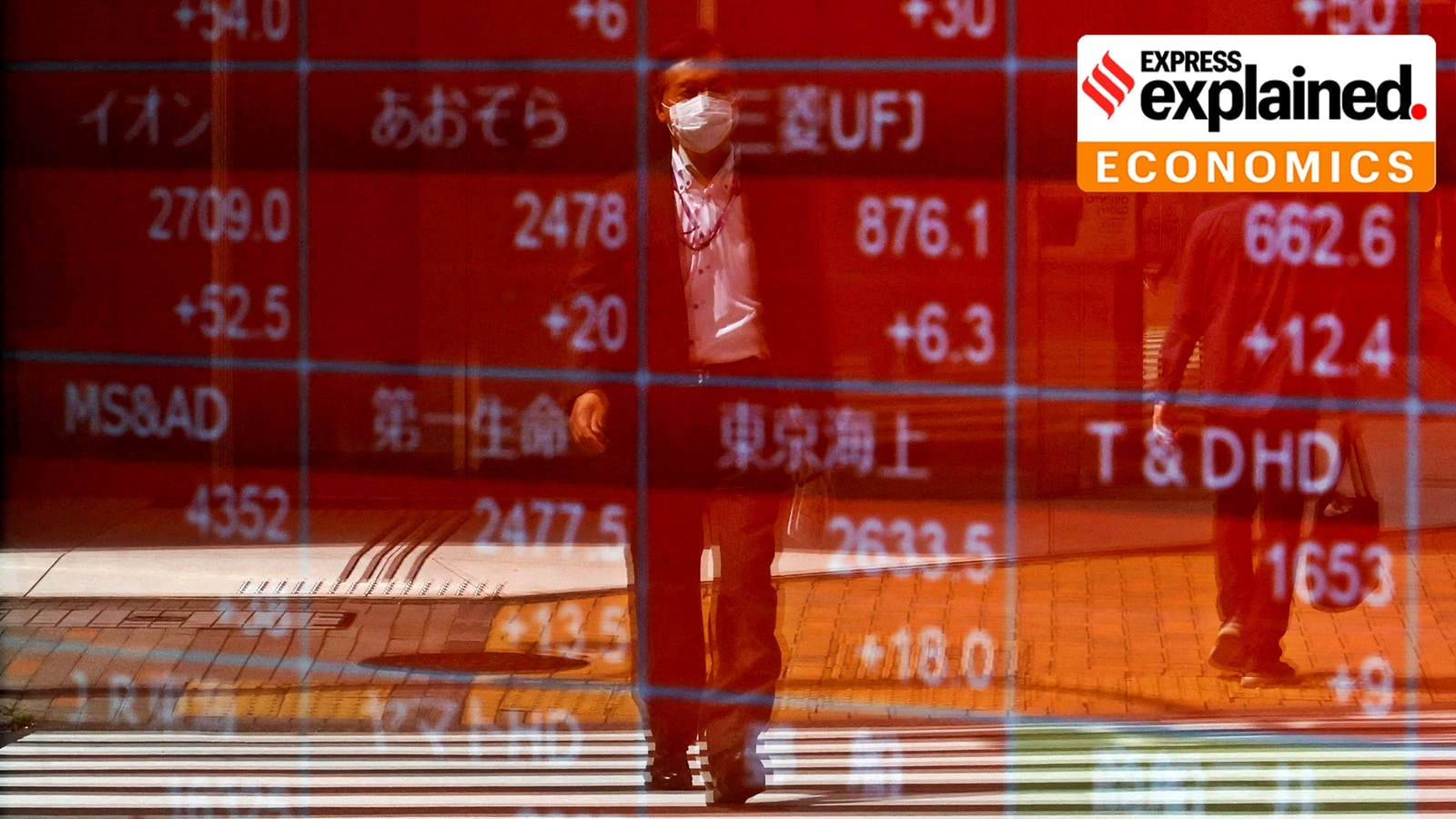Markets are down, but there’s no need to panic. Here’s why
Why share market is falling: The fall in global markets is the result of worries about a US recession and the outbreak of hostilities in the Middle East. But there is nothing wrong with the Indian economy. Indians should stay invested, and bet on large caps, experts said.
 While Indian benchmark indices fell by around 3% or more through the day, several key global markets witnessed sharper declines. The Nikkei in Japan was down by more than 12% on Monday, and the Kospi Composite index of South Korea was down 8.8%. (REUTERS/Issei Kato/File Photo)
While Indian benchmark indices fell by around 3% or more through the day, several key global markets witnessed sharper declines. The Nikkei in Japan was down by more than 12% on Monday, and the Kospi Composite index of South Korea was down 8.8%. (REUTERS/Issei Kato/File Photo)For investors riding on the rise and rise of the Sensex — from levels of 61,000 in May 2023 to 82,000 last week, a stupendous 34% increase in just 15 months — Monday’s fall came as a rude shock. The Sensex was at 78,929 at 1.45 pm, a fall of 2,050 points, or 2.5%.
However, there is no need for Indian investors to worry, market players assured on Monday (August 5).
The fall is driven by global concerns around recession in the United States, geopolitical concerns around the growing tensions between Israel and Iran and other Middle Eastern countries, and there are no concerns around the Indian economy, market participants said.
Markets and retail investors should not panic about their investments because of this correction led by global concerns, they said. However, investors should practise caution on where they invest, and should also lower their expectations on equity investments going forward, the experts said.
What led to the fall in the markets?
As written above, the fall has been driven by concerns around global growth and current geopolitical developments.
Experts said that while a soft jobs report in the US stoked fears of an upcoming recession, the weakness in global markets had begun on Thursday. The growing tensions in the Middle East after the assassination of three important Iran-backed figures, allegedly by Israel, and fears of an imminent Iranian retaliation, have been weighing on markets around the world.
While Indian benchmark indices fell by around 3% or more through the day, several key global markets witnessed sharper declines. The Nikkei in Japan was down by more than 12% on Monday, and the Kospi Composite index of South Korea was down 8.8%.
“The global risks associated with the rise in interest cost in Japan and an appreciating yen has led to an unwinding of carry trade. This will have implications for global equities, and is likely to see a rub-off for Indian equities as well,” Aniruddha Naha, CIO-Alternatives, PGIM India AMC, said.
Key indices in European markets were down by around 2.5% on Friday, and opened weak on Monday. While the GDAX in Germany opened with a fall of 2.95%, CAC 40 in France and FTSE in the United Kingdom were down by 2.8% and 2.2% respectively in the opening hours.
On Friday, the Dow Jones Industrial index in the US had fallen 1.5%.
Should this global decline bother Indian investors?
Market participants said that there is nothing wrong with the Indian economy, and the current fall has nothing to do with economic fundamentals in India, except for the fact that the markets had entered into an expensive zone.
“Investors should see it as a healthy correction as far as the Indian markets go as they have risen quite a bit over the last 12-15 months. Long-term investors should not worry, and should stay put in the market,” a fund manager with a leading mutual fund said.
Trideep Bhattacharya, President and CIO-Equities, Edelweiss MF, said: “Equity markets are reacting to economic weakness, highlighted by disappointing earnings from a few US consumer-focused companies. It’s crucial to monitor these developments closely in the coming months.”
So what should investors do — and what should they avoid?
They should definitely avoid panic-selling. Retail investors must stay away from day-trading and taking speculative positions in the futures and options segment. Experts said that in these times of global uncertainty, retail investors may end up burning their fingers by taking speculative positions in the market.
It is also important to note that in times of correction, large cap companies are better positioned to navigate the challenges. Hence, investors should stay away from betting on small and mid cap companies. While the Sensex was down by almost 3% on Monday afternoon, it is important to note that the mid and small cap indices at BSE were down 3.9% and 4.4% respectively.
This is a good time to start parking funds in large cap schemes in a staggered manner, experts said. However, investors must practise caution.
“Since there is a bit of uncertainty around the world, investors should park funds only in large cap funds or companies, and should avoid mid cap and small cap funds and equities as there are pockets of concerns there,” the CIO of a leading fund house said.
Also, while investors have seen a significant rally and returns from equity investments in the past, many say that they will have to tone down their expectations going forward.
“Investors need to tone down return expectations and allocate towards equities over the next 9-12 months, hopefully reaping benefits over the next 3 to 5 years,” Naha said.
- 01
- 02
- 03
- 04
- 05






































